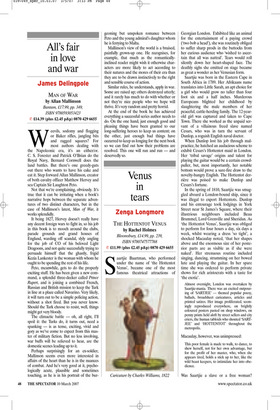All’s fair in love and war
James Delingpole
MAN OF WAR by Allan Mallinson Bantam, £17.99, pp. 349, ISBN 9780593053423 ✆ £14.39 (plus £2.45 p&p) 0870 429 6655 Weevils, sodomy and flogging or Baker rifles, jangling bits and ragged squares? For most authors dealing with the Napoleonic era, it’s an either/or. C. S. Forester and Patrick O’Brian do the Royal Navy, Bernard Cornwell does the land battles. But there’s one greedy-guts out there who wants to have his cake and eat it. Step forward Allan Mallinson, creator of both cavalry officer Matthew Hervey and sea Captain Sir Laughton Peto.
Not that we’re complaining, obviously. It’s true that it can be irritating when a book’s narrative hops between the separate adventures of two distinct characters, but in the case of Mallinson’s latest, Man of War, it works splendidly.
It being 1827, Hervey doesn’t really have any decent foreign wars to fight in, so his job in this book is to mooch around the clubs, parade grounds and grand houses of England, warding off scandal, slyly angling for the job of CO of his beloved Light Dragoons, and not quite successfully trying to persuade himself that the ghastly, frigid Kezia Lankester is the woman with whom he ought to be spending the rest of his life.
Peto, meanwhile, gets to do the properly exciting stuff. He has been given a new command, a splendid three-decker called Prince Rupert, and is joining a combined French, Russian and British mission to keep the Turk in line at a place called Navarino. Very likely, it will turn out to be a simple policing action, without a shot fired. But you never know. Should the Turk choose to resist, well, things might get very bloody.
The climactic battle — oh, all right, I’ll spoil it: the Turks do, it turns out, need a spanking — is as tense, exciting, vivid and gory as we’ve come to expect from this master of military fiction. But no less involving, war buffs will be relieved to hear, are the domestic scenes leading up to it.
Perhaps surprisingly for an ex-soldier, Mallinson seems even more interested in affairs of the heart than he is in the nuances of combat. And he’s very good at it, psychologically acute, plausible and sometimes touching, as he is in his portrait of the bur geoning but unspoken romance between Peto and the young admiral’s daughter whom he is ferrying to Malta.
Mallinson’s view of the world is a bruised, painfully grown-up one. He recognises, for example, that much as the romanticallyinclined reader might wish it otherwise characters are more likely to act according to their natures and the mores of their era than they are to be drawn instinctively to the right and sensible course of action.
Similar rules, he understands, apply in war. Some are raised up; others destroyed utterly; and it rarely has much to do with whether or not they’re nice people who we hope will thrive. It’s very random and pretty horrid.
At the end of the book he has achieved everything a successful series author needs to do. On the one hand, just enough good and pleasing things have been granted to our long-suffering heroes to keep us content; on the other, just enough bad things have occurred to keep us longing for the next book so we can find out how their problems are resolved. This one will run and run — and deservedly so.


























































































 Previous page
Previous page